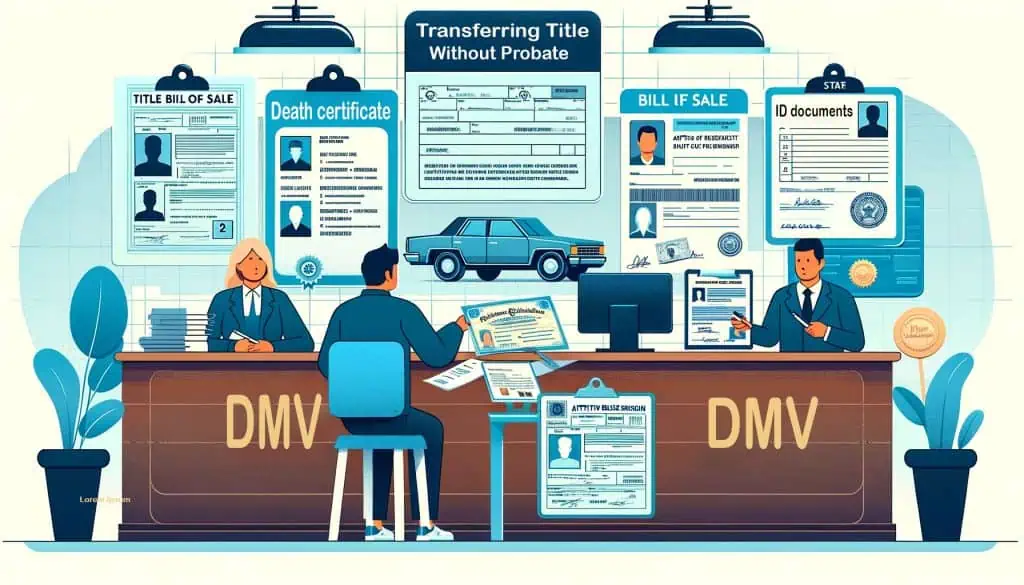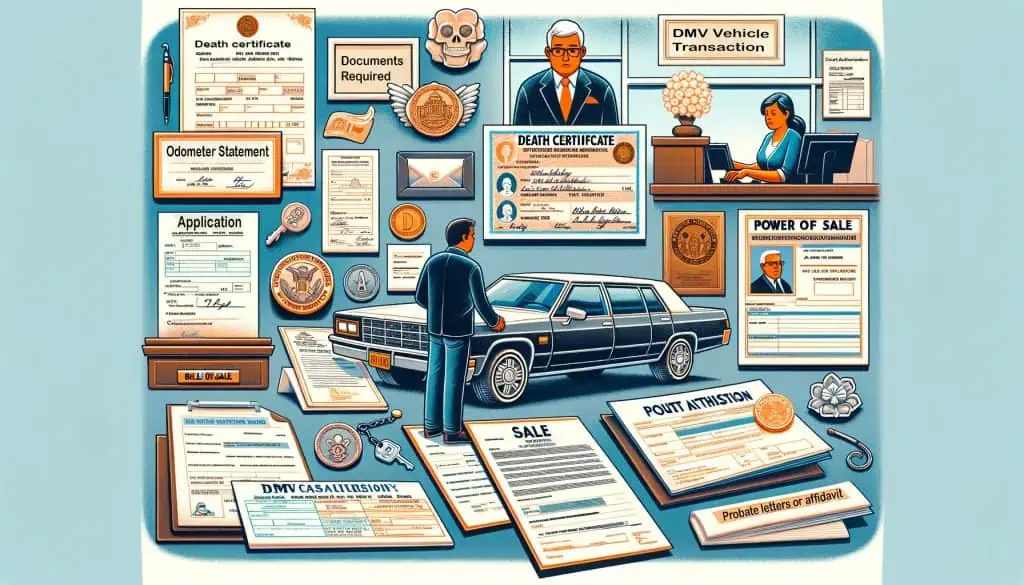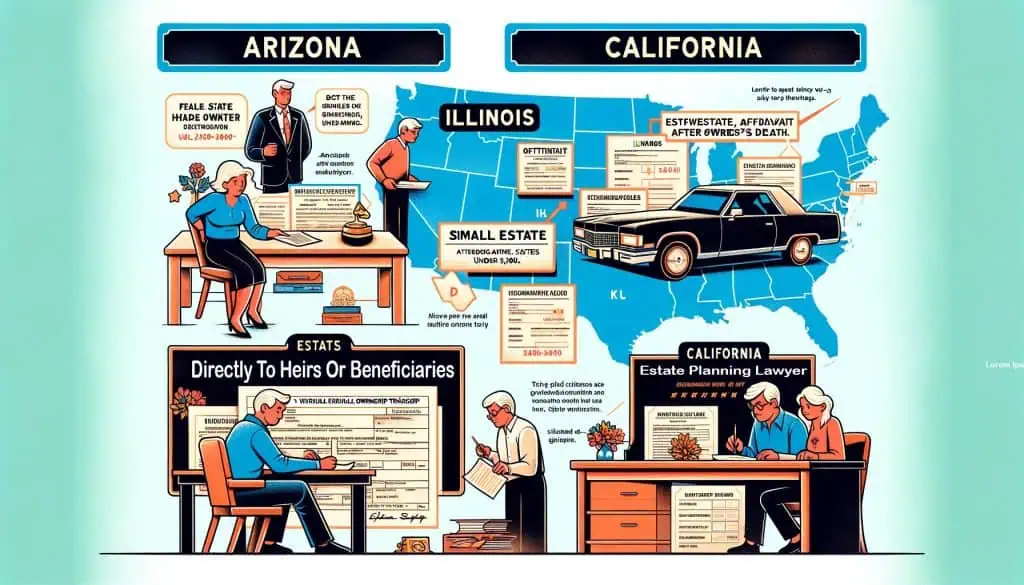Transferring a car title after an owner’s death can be confusing, especially for grieving family members.
As a former licensed car dealer, I have guided many clients through title transfers under various circumstances.
This process can be intimidating if you’ve never done it before, but having the right information makes a big difference.
In this article, I’ll walk through the step-by-step process for transferring a car title after the owner’s death in clear, simple terms. We’ll cover:
- What to do if the estate is in probate or if there is no will
- The documents you’ll need to provide
- Selling the deceased person’s vehicle
- Options if the title is lost
- State-specific guidelines
Relevant Articles to Read:
- How To Transfer A Car Title Out Of A Trust
- Can I Sell My Car Without a Title
- Can You Donate a Car Without A Title
- How to Get a Copy of Your Car Title Fast
- Where To Get a Car Title Notarized
Table of Contents
Key Takeaways: Transferring a Deceased’s Car Title
- The process depends on if there’s a will and if probate is involved
- Required documents: death certificate, title, court orders, fees
- An executor or spouse/heir can transfer ownership
- Steps vary by state but filing paperwork at the DMV is standard
- The vehicle can be sold once new titleholder completes the transfer
Is the Estate Going Through Probate?
Before doing anything else, you need to determine if the deceased person’s estate is being probated.
What is probate? It’s the court-supervised legal process for distributing someone’s assets and property after they die. It verifies the validity of the deceased’s will, oversees payment of debts and taxes, and authorizes transfer of titles.
- If there is no will – the probate court decides who inherits assets like vehicles according to state law. This is a complex, months-long process.
- If there is a will – assets transfer to heirs as specified. The estate executor oversees the court-approved distribution.
In either case, the car title cannot be changed until probate concludes.
Next step: File paperwork…
Transferring Title Without Probate
If probate is unnecessary, such as with a valid will or small estate, the car can be transferred much more quickly.

The surviving spouse, joint owner, or beneficiary simply provides several key documents to the Department of Motor Vehicles (DMV) to retitle the vehicle:
- Death certificate – Establishes the original owner has passed.
- Title or bill of sale – Shows ownership transfer details like sale price.
- ID documents – Drivers license, social security card, etc.
Additional forms may be required by certain states:
- Affidavit or release of ownership – Replaces a lost or missing title
- Tax forms – State vehicle sales, use, gift taxes
The heir can then register the vehicle under their name once the new title is issued. Visit your local DMV with the documents ASAP to avoid a lapse in registration or potential penalties.
Transferring Title in Probate
Navigating the probate court system allows for the legal distribution of property when complex or disputed inheritance arises. It is overseen by the executor as the estate representative.
Steps may involve:
- Hiring an attorney – An experienced probate lawyer can advise you on state laws and streamline the process. The court must approve legal representation.
- Obtaining authorization – The executor will petition the court to distribute the vehicle title. The judge decides on validity and issues a transfer order.
- Filing DMV paperwork – Once approved, visit DMV to officially change ownership, like title transfer without probate above.
Getting approval requires submitting the death certificate, will, and other supporting documents. The executor then facilitates sale or registration in the new owner’s name.
Next step: Determine what documents are needed…
Documents Required for Title Transfer
These crucial records provide evidence of the deceased owner’s passing, identify the heirs or buyers, and allow legal control of the vehicle to change hands:

- Death certificate – Original certified copy should be requested as soon as possible.
- Existing car title – Shows who the registered owner is. Replace if lost or bring an affidavit.
- Court authorization – Probate judge’s order granting ownership change.
- Sale/transfer forms – Bill of sale, ownership transfer, power of attorney papers.
- DMV vehicle transaction application – New title requires completion of applicable forms for your state.
- Odometer statement – For some private sales, odometer reading at time of transfer must be recorded.
- Probate letters or affidavit – Court or sworn statement allows estate distribution without full probate.
If selling the vehicle, the buyer completes the purchase and registration documentation.
Collect these supporting documents before going to the motor vehicle authority. Proper ID is also mandatory. Processing can take 30-90 days.
Next step: Decide whether to sell or gift the car….
Selling the Deceased Person’s Vehicle
Once authorized, beneficiaries or executors have the right to sell the inherited car. Consider these factors if liquidating the asset after the owner’s passing:
Ease of transfer
- Is there a surviving spouse or single beneficiary named? No complex ownership = easier process.
- Multiple heirs may have to negotiate a buyout or agree unanimously.
- Consult an estate planning or probate attorney about your situation.
Vehicle worth
- Check Blue Book value – is it a classic or collectible car? Consider an auction for maximum sale price.
- Factor in the loan payoff amount if any balance remains. Typically, this transfers with the title.
- Compare the cost of repairs needed vs. selling in current condition.
Sale process
- Private sale may be quicker if you know an interested buyer.
- Dealerships or consignments handle advertising and paperwork for a fee.
- List on Autotrader, Craigslist, eBay to access more buyers.
Transferring a title before selling avoids hassle for the buyer. Consider an estate sale professional for very high-value vehicles.
Lost Car Title Solutions
Although it’s optimal to locate the original title, transferring ownership is still possible without the actual document by filing an appropriate replacement form.
If the registered owner has passed – The next of kin or named beneficiary visits the DMV to request a replacement title. Provide a death certificate and ID proving your relationship.
Without beneficiary access – If another family member possesses the vehicle, an Affidavit or Release of Ownership must be completed.
This sworn statement transfers control despite a lack of clear inheritance. However, the new owner still needs to formally apply for title transfer afterward.
No matter what, don’t panic if faced with a lost car title after the owner dies. As long as you have the proper supporting documents, the process may take a little longer but can still be resolved.
Stay organized, seek help from a professional if needed, and confirm the process with your state motor vehicle department.
State-Specific Vehicle Ownership Transfer Guidelines
The required documentation and processes for legally retitling a vehicle after the owner’s death varies by state.

For example – Arizona allows a surviving family member to transfer ownership by submitting an affidavit instead of requiring full probate for estates under $75,000.
Meanwhile, in Illinois, the car can be transferred to a spouse without probate using a small estate affidavit for estates worth less than $100,000.
And in California, the DMV actually provides simplified forms for transferring without probate directly to heirs or beneficiaries.
So check on your individual state’s policies when navigating vehicle or asset inheritance. An estate planning lawyer can advise on where you fall in complying with state statutes.
Is an Attorney Necessary?
While hiring a probate or estate attorney is not legally required in most situations, they can be extremely helpful guides. Lawyers act as impartial advocates armed with special expertise.
Attorney assistance proves useful for:
- Complex family arguments over asset distribution
- Large estates with multiple vehicles or properties
- Homes titled only in the decedent’s name
- Out-of-state property ownership
- Lawsuits against the estate by creditors
- Confusion over inheritance laws or taxes
Determine your needs and budget based on your specific circumstances. Many lawyers offer free consultations about transferring car ownership after death. They can then tailor service fees appropriately.
My Final Thoughts
Ultimately, the method of transferring vehicle title hinges on several key factors – whether the estate is probated, the number of surviving heirs, debts owed, and state-specific regulations.
Sources For This Article:
- https://trustandwill.com/learn/how-to-transfer-a-car-title-from-a-deceased-owner
- https://www.capitalone.com/cars/learn/finding-the-right-car/how-to-transfer-a-car-title-when-the-owner-is-deceased/2805
- https://www.lawjtlg.com/2022/05/19/how-to-transfer-a-car-title-upon-a-persons-death/
- https://www.law.cornell.edu/regulations/illinois/Ill-Admin-Code-tit-92-SS-1010.150
- https://www.carsdirect.com/dmv/change-of-ownership-how-to-transfer-a-vehicle-without-probate
- https://www.dmv.ca.gov/portal/vehicle-registration/new-registration/special-circumstances/handling-a-deceased-persons-dmv-matters/
Legal Disclaimer: The information provided in this article does not constitute legal or tax advice and is provided for informational and educational purposes only. Laws and procedures regarding transferring vehicle ownership vary by jurisdiction, and the author cannot guarantee the completeness or suitability of this content for your specific situation. You should always consult a qualified probate or estate planning attorney in your local area for professional advice related to your particular circumstances.



